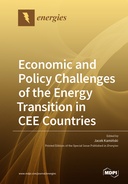Explore

Economic and Policy Challenges of the Energy Transition in CEE Countries
0 Ungluers have
Faved this Work
Login to Fave
With the announcement of the European Green Deal, which defines a set of policy initiatives aimed at achieving a 50–55% reduction in carbon emissions by 2030 and making Europe climate neutral in 2050, the challenge of energy transition becomes even more critical. The transformation of national energy systems towards sustainability is progressing throughout all Central and Eastern European (CEE) countries, yet the goals and results are different. Most EU Member States have made substantial progress towards meeting their long-term commitments of emissions reductions. However, some bloc members have struggled to meet their obligations. An effective energy transition requires the introduction of appropriately designed policy instruments and of robust economic analyses that ensure the best possible outcomes at the lowest costs for society. In this context, this Special Issue aims to bring into the discussion the challenges that CEE countries have to face and overcome while undergoing energy transition.
This book is included in DOAB.
Why read this book? Have your say.
You must be logged in to comment.
Rights Information
Are you the author or publisher of this work? If so, you can claim it as yours by registering as an Unglue.it rights holder.Downloads
This work has been downloaded 134 times via unglue.it ebook links.
- 134 - pdf (CC BY) at Unglue.it.
Keywords
- Biomass
- bootstrap panel Granger causality
- capacity adequacy
- capacity market
- carbon emissions
- cash-flows
- charging stations
- climate and energy policy
- Climate Change
- Climate Policy
- Clustering
- CO2
- CO2 emissions
- coal-fired power plants
- cogeneration
- combined heat and power
- consumption rate of interest
- coopetition
- cost of capital
- cost of equity
- COVID-19 Pandemic
- customer preferences
- data analysis
- decarbonisation
- decarbonization
- discount rate
- district heating
- driving technique
- economic appraisal
- efficiency engines
- electric car
- electric vehicle
- electricity demand profiles
- Electromobility
- Emissions trading
- energy balance
- energy companies from Central and Eastern Europe
- Energy consumption
- energy cooperatives
- Energy Efficiency
- energy law
- energy mix
- Energy policy
- energy transition
- energy transition in Poland
- EU ETS
- EU transition economies
- FGD gypsum
- financial globalization
- fleet electrification
- fleet management
- flue gas desulphurisation
- Food security
- grand challenges
- grant
- green energy transformation
- History of engineering & technology
- Households
- Hubgrade
- hydrogen cells
- indicators
- individual cogeneration premium
- limestone sorbents
- Linear Programming
- Lockdown
- low-carbon technology
- Management
- multiple factor analysis
- new investments
- onshore wind
- optimization
- PHEV
- photovoltaics
- platform
- Poland
- Polish energy mix
- power generation
- Ramsey formula
- real GDP per capita
- Regional studies
- remuneration mechanism
- renewable energy
- Renewable energy communities
- renewable energy grants
- renewable energy policy
- Renewable energy sources
- renewable energy sources (RES)
- renewable energy support
- Risk assessment
- Social acceptance
- social discount rate
- social opportunity cost
- support systems
- Sustainable development
- Sustainable development goals
- Sustainable Mobility
- Technology, engineering, agriculture
- Technology: general issues
- Thermal energy storage
- trade globalization
- uncertainty
- “Mój Prąd”
- “My Electricity”
Links
DOI: 10.3390/books978-3-0365-3498-5Editions

